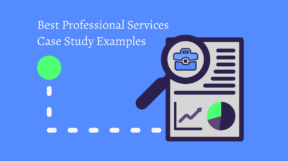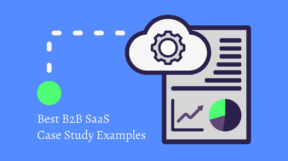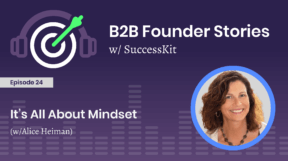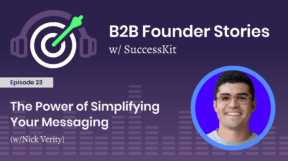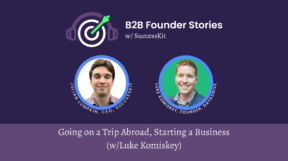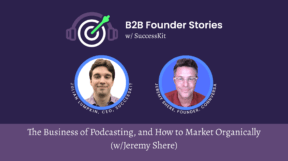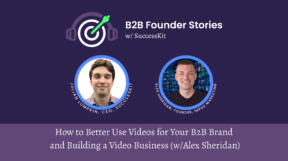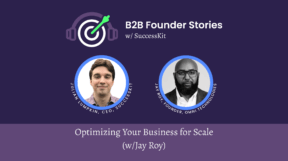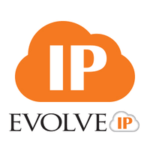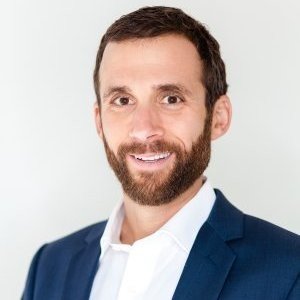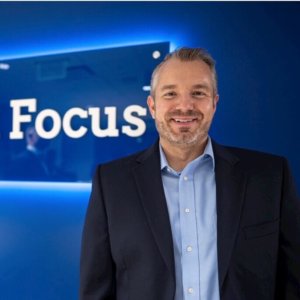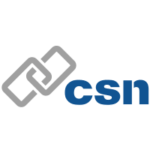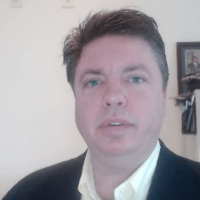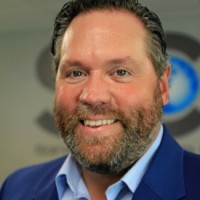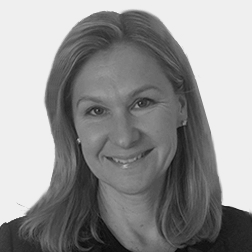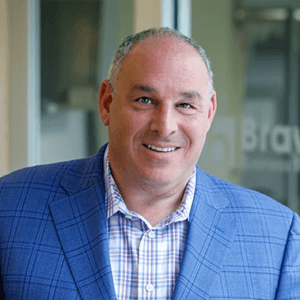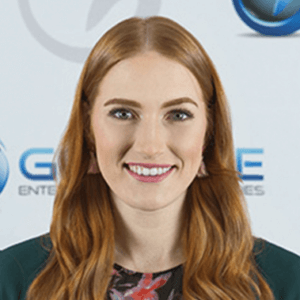Listen to this episode now on Spotify or Apple!
Our guest on the eighteenth episode of our podcast is a big one: Chris Walker of Refine Labs, who has a compelling perspective on lead attribution and a holistic approach to marketing. In this episode, he describes how his side hustles outgrew his day job, leading him to start Refine Labs and experience amazing growth. Chris shares some of the specific things Refine Labs does better than the traditional marketing agency, including their approach to revenue research and development, dark social, and more.
“To be clear, I still sell deals, I still work with customers, I still do account reviews, I post on LinkedIn. I quote-unquote ‘do’ marketing and product marketing. So I’m in it. And I think the time to step back is when you have traction in a repeatable motion. So I stepped back in the middle of 2021 when we had traction in a repeatable motion, and things were going really well, and we started hiring great people around us. Now the economy has slowed down over the past year, we have to shift. What our customers need is different than what they needed 18 months ago in the growth of all-cost era. And so we ought to go back to the drawing board, rethink our pricing and packaging, rethink our offer, rethink the talent that we have, rethink how we help companies, how we position, how we get started, what the journey looks like, how long do they work with us. And so I’m back in talking to customers, running sales processes, and doing these things because it’s critical to business success. As you are the CEO, you need to have those details at a point when you’re making a strategy adjustment.”
Chris Walker, Founder of Refine Labs
Transcript of Podcast Episode 18: Chris Walker on Dark Social, Revenue R&D, and Starting Refine Labs
Julian Lumpkin: My guest today is a big one. We have Chris Walker of Refine Labs. I have followed Chris for a long time, and as I tell him, his perspective on lead attribution and what I would call a more holistic approach to marketing have always resonated with me as a salesperson and now as marketing agency owner. In this episode, he tells a story of how his side hustles outgrew, his day job, leading him to start Refine Labs and the amazing growth they’ve experienced since. Chris shares some of the specific things Refine Labs does better than the traditional marketing agency, including their approach to revenue research and development, dark social, and more. Before we dive in, quick reminder that if you need help with case studies, video testimonials, or other social or customer proof content that can help drive your B2B, sales and marketing, visit us at SuccessKit.io. Hope you enjoy the episode.
Chris Walker: Chris, thanks for joining Julian, awesome to be here. Thanks for having me on the show.
Julian Lumpkin: All right, so to begin, can you very quickly tell us about Refine Labs? What you guys do?
Chris Walker: Yeah, absolutely. Hey, everyone. My name is Chris Walker. I’m the CEO of a company called Refine Labs that I started in 2019. since then, we’ve worked with more than 200 high-growth B2B companies on accelerating their overall revenue and demand generation programs that could come into advertising content and creative CRM management and marketing ops. So, in a lot of different areas, basically solving the most important growth challenges for some of the most well-known VC-backed companies out there.
Julian Lumpkin: And can you give us a general sense of the structure of the company? Are you guys funded? How many employees do you have? Just a general idea of the size and scope of the business.
Chris Walker: Yeah, the company’s bootstrap. We have about 75 full-time employees at the moment. we have raised debt financing. So people ask me about that, thinking it was an equity raise, but we raised debt financing in 2022 to support working capital and some future growth investments. and so that’s how we’ve built and scaled the company. It’s really interesting as an entrepreneur, when you start a service company like this, it ends up being sort of profitable from day one, which is different than a lot of technology companies. But scaling without funding in terms of working capital can be really challenging. And we grew significantly during 2021 and 2022. And, doing it without an equity raise or even debt financing up to that point was really challenging. You’re monitoring margin every single month. So it was a really interesting learning for me, going through that scale phase in the early 2000, 2020s.
Julian Lumpkin: Cool. I want to come back to the scale phase, but I’d like to kind of rewind all the way to kind of understand how you got here. So starting, from the very beginning, what did you want to be when you were growing up?
Chris Walker: I think I bought into a lot of the propaganda at the time, if I’m being honest. The early 2000s. What’s the propaganda? Be a doctor, be a lawyer, go spend $300,000 on education. I was really good at math and science. I ended up went in studying pre-pharmacy, and quickly after going through an organic chemistry class that I’m not in for this. So I switched to, biomedical and electrical engineering, got out of college. worked inside of B2B companies doing marketing operations, product management, things like that, for about ten years. During that time, I also started two ecommerce companies. So technically, Refine Labs is my third LLC. Two, ecommerce companies. One in 2012 to 2015, where I started to figure out, hey, Facebook ads, Instagram ads, Amazon Search ads, learned a lot about marketing and branding and business overall. The second one was 2016 to 2018 that I built. And that one was really fueled by organic Instagram image content. So, user-generated content, influencer marketing, things like that. And by building those two very small businesses, that didn’t go very far. Then all of a sudden, the opportunity on LinkedIn starts to come up in 2018, 2019, and I know exactly what to do. So because I had worked through the Facebook and the Instagram and some of the other social channels before it doing marketing to sell stuff, I was able to really identify, hey, there’s a big opportunity on LinkedIn, and then actually know what to do to capitalize on it.
Julian Lumpkin: Were those two smaller businesses full-time gigs, or were you doing those on the side?
Chris Walker: Those were side hustles, man. I’m making like $80,000 a year being a marketing manager or something like that at a company and making 200 grand selling stuff on Amazon. So it was a good supplemental income source. it was mainly to learn, if I’m being honest. I didn’t think that I was going to become a millionaire through any of those things. But I did know I don’t want to work for someone forever, and I got to figure out business fundamentals, and this was a great way to do it.
Julian Lumpkin: So talk to us about the initial formation of Refine Labs. What, was your intention? Was the intention always to build a company nearing 100 employees and maybe raising some money and really growing, or did it start just kind of wanting to work for yourself? Explain what the initial intentions were.
Chris Walker: Yeah, in early 2019, I, basically was fired. I was asked to resign from the company I worked at as a head of marketing, a series, a company. They just actually exited last week, and I got a little check on my equity. So that was nice. But I was asked to resign. and then I started to look for other head of marketing jobs inside of tech companies, and couldn’t even come up with the energy to apply for them. I was like, I just don’t want to do this again. I’ve been ahead of marketing in several companies with executives that don’t get it, that go-to market is flawed. I couldn’t bring myself to do it again. And so I ended up calling a couple of people. I network, I got a couple of consulting gigs. All of a sudden, you replace your salary with different, income pretty quickly. Then my original plan was to build it to a million bucks cash flow. I started buying real estate. That was the original plan. And then in late 2019, the business starts to grow fast, and I’m getting significant traction on LinkedIn that I didn’t really expect. I didn’t expect it because I didn’t recognize how unique my point of view and ideas were to the overall industry. And so I started to figure that out on LinkedIn. Learned that this was a large problem inside of almost every B to B company, and how are we going to actually fix marketing and drive positive ROI, which also forces us to rethink how we headcount for sales and SDRs. And so, it was a really great experience.
Julian Lumpkin: How long did it take you to get to that kind of million-dollar mark that you initially set?
Chris Walker: It was probably about nine months. We’re on a recurring revenue basis, right? So you haven’t actually collected a million bucks, but you’re doing a million arr. So, it was probably about, probably about nine months. And, during that time, in early 2020, actually, it was, post-pandemic, I was like, why am I going to go buy real estate right now? We could build a 2000 and 5000 million dollar company, based on this core thesis that I’ve identified. And it’s working. So I brought in a business partner. We started building the company, and we had significant traction in 2021. Specifically was sort of like the coming out point. I think going into 2021, we had about ten people, and at the end of 2021, we probably had 50. We grew revenue almost five X, I think, as well. So headcount and revenue five X in 2021, which was super fun. One of the best times in this company.
Julian Lumpkin: Yeah. This may be a bit of an aside, but as you were growing, you mentioned being bootstrapped most of the time. What would you say was the most challenging aspect of it? Or what part of it was more difficult than you expected?
Chris Walker: I think there’s different things at every different stage. Right. At like, seven people, the issue is like, I need an operator, I need a COO-type of person. Right. So at seven people, you sort of have that issue, at like 15 people, and we’re starting to grow fast, it’s like, we need to figure out how to recruit talent. and we were able to attract a lot of talent through my LinkedIn presence. But then we start, like, at some points, we were hiring ten people a month, and you got to have a real engine to hire ten good people every month. So, recruiting was an issue at one point. Pricing, and margins have come up before. Right. You’re in a professional service business. Tighter margins than SaaS, for sure. and so pricing and margins has been a challenge at one point or another in the history of the company. So I think it really varies. I think that a lot of business challenges get represented in almost every business. You face them at different points of scale.
Julian Lumpkin: A lot of the founders I speak to, when they start to really grow and scale a company, struggle to give up control of a lot of the day-to-day operations. They want to do things themselves. I get the sense that that came a little more naturally for you. How did you think about kind of bringing on people to run the business so that you can focus on bigger picture things?
Chris Walker: Yeah, I mean, to be clear, I still sell deals, I still work with customers, I still do account reviews, I post on LinkedIn. I quote, unquote, do marketing and product marketing. So I’m in it. and I think the time to step back is when you have traction in a repeatable motion. And so I stepped back in the middle of 2021 when we had traction in a repeatable motion, and things were going really well, and we started hiring great people around us. And we have super talented leaders here. And now the economy has slowed down over the past year. We have to shift. What our customers need is different than what they needed 18 months ago in the growth of all-cost era. And so we ought to go back to the drawing board, rethink our pricing and packaging, rethink our offer, rethink the talent that we have, rethink how we help companies, how we position, how we get started, what the journey looks like, how long do they work with us. and so I’m back in talking to customers, running sales processes, and doing these things because it’s critical to business success. As you are the CEO, you need to have those details at a point when you’re making a strategy adjustment. So that’s where we are right now.
Julian Lumpkin: Can you walk me through your decision-making process of deciding to take on, I think you said, some capital in 2021?
Chris Walker: Yeah, April May 2022, I think, is when we, formally announced it. Look, in the middle of 2021 to early 2022, it was the boom times of SaaS new unicorn. Every single day. Tons of companies have funding. I knew marketing, companies that had a $30 million run rate business, and their marketing team had a $20 million budget. It was insane. Right. And so money was really easy. Marketing budgets were huge. we just closed a ton of ton of high paying, high-profile customers during that time. And as you’re scaling headcount and you’re scaling customers, and you don’t take money off the table like I do, I have taken no money out of the business the entire time that you realize, hey, our monthly expenses are exceeding a million dollars a month, and we have one, .2 million in the bank. this is actually a business risk. And so, for a risk mitigation standpoint, we needed working capital. We found a partner called Tamaya Capital based out of, Canada. And, we did a mez debt round. four-year, $4 million debt.
Julian Lumpkin: What is your long-term vision for Refine Labs now?
Chris Walker: I think that there are a couple of different angles that we’re taking right now. Basically, over the past three years, we’ve built three different sort of, like, business practices. We have demand in ABM strategy and execution. We have content and creative campaign production. And, we have a digital education product called The Vault. as you think about the future, like, tying in marketing operations, deeper podcast and video production, you could basically build all of the capabilities that a B2B marketing team needs. at the beginning, I thought we were going to be, quote, unquote, like, B2C brands do AOR. Big B2B companies do, too, but it’s not as common. Big B2C companies do agency of record, where they basically name an agency that has full capabilities, and then they pay that agency one to $10 million a year. B2B companies don’t really operate like that. B2B, for whatever reason, don’t like seeing a million-dollar bill from one vendor. is what I’ve learned. and so perhaps we will actually break down into separate, distinct brands. Instead of charging $100,000 a month for five services, you charge $20,000 a month for those five services through five different companies. And more of, like, a private equity or holdings company or what I’m seeing as, like, a go to market ecosystem play. and so there’s some different directions that we could go, but long-term vision fundamentally shift how B2B companies think about, measure, and execute their marketing strategies, which then influence overall go-to market. And we’re going to continue to work down that path, starting with demand generation advertising content. We’ve moved into operations attribution analytics, and so we’ll continue to assess what our current customer base and what the market needs, and continue to look for opportunities.
Julian Lumpkin: What about in terms of the size and the scope of the business? Do you want to just keep growing it as large as you can? Or is there sort of a point that you hit that you say, I don’t really want to run a company over 100 million or 200 million. Do you have a sense of that?
Chris Walker: So, if you have a business that’s not growing, it’s dying. So, like, getting a business to 10 million in revenue and then saying, hey, we’re just going to sit here at 10 million, it means your business is dying. it doesn’t mean that I’m going to be the one who takes this thing to 100 million ARR. Right. So I’m the owner and the acting CEO. So if it comes a point where I don’t feel capable or I don’t want to continue to scale the company for whatever reason, I got to go and find an owner that’s going to continue to grow it and inspire people and set the vision and things like that. So that’s my responsibility as the primary shareholder of the company as well. But you can go and look at Proxies, right, from like a research advisory consulting market caps are incredible. Look at the Gartners and the foresters of the world. If you look at agency land, they’re pretty much consolidated into four major holdings companies, but really big industry and market there. So, the overall opportunity is massive.
Julian Lumpkin: Yeah, I want to shift for the last kind of five or ten minutes here to, some of your expertise. So, there’s a few terms that I notice you use a lot and I’m not sure if you invented them or popularize them. but before we do that, just in case some of the listeners here don’t know much about Refine Labs, can you try to define for us how you are really different from other agencies?
Chris Walker: Yeah, I mean, there are two major core differences. The first one is our mindset and how we think. and so breaking the actual demand cycle into three phases demand creation, demand capture and demand conversion. And, looking those at three separate things is critically important. Most companies only focus on demand capture and demand conversion. I e. Performance, marketing, and sales. And demand creation is a critical, arguably the most critical component of driving long-term business growth. And so by looking at them each separately, we’ve created new measurement models, new Attribution models, new strategies on LinkedIn Ads or Google Ads or all these different places that are fundamentally different than what customers ask for. A core advantage is that we do what our customers need, not what they ask for. My company would be ten times as big if we ran a lead gen agency or a content syndication agency or some shit like that. So it’s what the market wants, but it’s not what they need, because I see the business data and I see how much money gets wasted in those places. and so it’s harder at the beginning to scale and grow a business when you’re selling something that the market doesn’t know they need yet. which then led us to our LinkedIn and Podcast strategy to educate the market and we’re making good strides. And even companies that don’t pay us implement the information and get much better results and tell other people. But still, even you go and look, and you look at the top 50 VC-funded SaaS companies. Less than 10% of them, run hybrid Attribution. Most of them are running lead gen strategies on LinkedIn ads. It’s all 2016 to 2018 type of strategies. and just given how much the world has changed, which got dramatically accelerated during COVID to what we call dark social, it’s probably where you’re leading anyway. So I’ll get into it. What we call dark social, the way that B, two B buyers fundamentally discover, research, and evaluate products has fundamentally shifted and has been accelerated through the scale and maturity of the internet. So there are tons of different word-of-mouth channels, content sharing, content amplification that doesn’t get tracked by attribution software and doesn’t create intent data for B2B companies. And therefore it never gets measured. So a lot of people don’t even see that it’s happening. But underneath, people are seeing your LinkedIn posts, they’re sharing your podcast, they’re looking at YouTube videos, they’re inside of different Slack or Discord communities, or Facebook groups, or LinkedIn groups with their peers. Slack communities, internal email. All these places that buyers use to get information, or get information, discover new information that don’t get tracked by attribution software, don’t get credit, and drive a majority of B2B purchases is the core shift. And so, while companies continue to use this outdated, touch, point-based, digital attribution model that’s going to favor, demand, capture, captera, Google search, SEO, that type of stuff, all these other things are happening that aren’t getting measured, that are actually driving the impact. And so we’ve been able to take advantage of this at our company. We’ve helped more than 200 companies continue to take advantage of this opportunity, both through paid, earned, and organic opportunities. So this isn’t just a paid strategy or an organic strategy. And, we just believe that it fundamentally matches better to how buyers want to buy and discover things today, therefore being a lot more cost-effective.
Julian Lumpkin: Yeah, the attribution thing is very interesting. And before I started a small marketing agency, I was in the sales world. And I think I’m not sure how much you see this, but I think your message about attribution resonates with sales reps really well, because we’ve been on the other side of this. not to say we had any answers, but we understood that when we got a lead from someone who found out us about us in a slack group or organically that was gold. And that real kind of natural organic lead, rather than a list of five people we kind of tricked into downloading a white paper or something like that. so I think the Attribution thing really resonated. I’m sure it resonates with marketers as well. But for me, coming from a sales perspective, I was kind of like, I’ve been seeing that forever. We feel like it’s, very prevalent, especially at venture-backed SaaS companies. Still to this day, I think.
Chris Walker: Yeah. I mean, some CROs or SVPs of sales end up being our biggest evangelists and top customers, because they know that’s different than in 2018, where they could brute force their sales team to hit the number with high cost of acquisition. That today. They need marketing execution in order to hit their goal through and through. They’re not going to hit the goal without proper marketing execution. I just, got off a call with a Series C company. They’re experiencing a $2 million a month pipeline shortfall from marketing at the beginning of the year. If that continues, then they’ll miss their revenue target by about four $6 million in net new business every single month. They don’t fix it. It causes significant issues to business valuation. It’s a major problem that needs to get solved. and who’s leading the charge on that? The Chief Revenue Officer. Because he knows.
Julian Lumpkin: Yeah. So you brought up the term dark social. can you try to define this in a really simple way for our audience and how it’s different from a regular social media or SEO strategy?
Chris Walker: Everyone out there that makes buying decisions is now using a mobile device primarily to consume information. I get that you have a B, two B desk job, and you use your laptop, but even inside your laptop, the places that you’re using have significant privacy policies that do not allow those platforms to send data back to your CRM or marketing automation platform. So Slack Communities, LinkedIn, places like that have privacy policies to protect their users and therefore don’t send the data. So all the places that people get information today are not sending data back about what they’re doing to your CRM. And that’s really the gap. Everyone’s doing this. The current state of how they measure does not measure it. Therefore, they have this blind spot of what’s actually driving impact today. and it’s very simple. You said it like, if you’re a salesperson, you go and ask a person how they heard about you on the sales call. You’ll have a very good sense about whether or not you’re going to close that deal afterwards. Our salespeople celebrate when we get a CMO that comes in that says, I’ve been listening to your podcast for two years. We just have a much better chance of winning that customer than someone that gets referred to us that hasn’t heard of us before.
Julian Lumpkin: Another term, I’m not sure if you created, this one, or just popularized it, but revenue, R&D or research and development. can you explain to us what that means?
Chris Walker: Yeah. Revenue R&D actually was my term. I came up with it in August of 2022. after about four years where I went back and looked at patterns of how I executed marketing for a couple of venture-funded companies that I worked for before I started my company and then how I’ve been able to grow my company and then how I, as a consultant and as my team, helps other companies grow, which basically built a scientific process, just like you do. Develop your product. Your engineering team comes to you and says, hey, the customers want this feature. It’s going to take us nine months to build it. Here’s this project plan that we’re going to build. It’s going to show how we get from nothing to launch this feature and so that we know whether or not we’re on track. And it’s just applying the same basic product development principles that we use in engineering and product development to developing marketing programs and putting together a plan over an extended period of time about how your podcast becomes something that drives a million dollars in revenue for you, because it’s not going to happen in month one. And most B2B companies shut off their podcast after five or ten episodes because they don’t look at it over a long-term view with a plan of how they’re going to get there. And so I’ve just seen over and over the marketers, try and launch a new revenue program and have it get shut off, including myself, have it get shut off or shut down by the executive team within the first three months. And it just restricts marketers and it lowers creativity. And it’s going to be better for the industry to have a framework about how we’re actually going to work through this so that more marketers can be more successful by having a plan for executives on what’s working, what’s not, and what we’re doing next.
Julian Lumpkin: How long do you think it takes? I’m sure there’s a huge kind of variation here, but like A, B2B company to develop a podcast, how many episodes, how long before they can expect it to start to generate leads or help close, help generate leads, I should say.
Chris Walker: Depends how good you are at it. How long is it going to take someone that’s 30 years old to try and get into the NBA? It could take forever. If you’re LeBron, it wouldn’t take more than a day. So it depends how good you are on it. we were driving business out of our podcast within the first 30 days. I was driving business off of LinkedIn within the first 30 days. I’ve also been doing paid and organic social media marketing to sell stuff since 2012. And so it depends how good you are at it. The fact of the matter, though, is that we’re not going backwards here. So even if you’re not good at it, you got to figure out how to be good at it, because it’s become a core business skill executing on these channels, hosting a podcast, hosting virtual events, posting on, social platforms like LinkedIn. If you sell to a B2B audience are no longer optional.
Julian Lumpkin: When a B2B company is making a podcast, how important or how closely related to the actual solution they provide? Does the subject matter need to be? Because a lot of people, like myself included, may try to start a podcast, but my company creates case studies. No one wants to listen to a podcast all about case studies. So how closely related does the podcast need to be to the solution itself?
Chris Walker: This is a strategy decision. I think, in some instances, being very narrow could work. but the approach that I’ve taken, the approach that I think a lot of people take is trying to, how do I say this? To create the content around whatever your target customer cares about or needs to know. And so I think focusing it on and it’s interesting because my content is not focused on the sales professional, or the sales leader, or the marketing leader, or the CEO, or the CFO. It’s focused on what the business needs. and so that’s an interest. As I talk through it, it’s really interesting. Centering the content around the things that your target accounts need. The information your target accounts need is really a really interesting strategy and a way to think about it. We basically cover go-to-market for high-growth B2B companies is our strategy.
Julian Lumpkin: All right, well, I know we’re up on time. Here my last question. to talk about the topic of the day. I saw you made a post recently on LinkedIn, talking about how AI technologies like Chat GPT will basically make the traditional content creation approach, or the old way of doing it, of kind of copying/pasting it, sharing unoriginal ideas in a really organized format to create a nice blog obsolete. But you also mentioned that, if I heard you correctly, this is really a huge opportunity for B2B marketers. How do you see this kind of next generation of content as an opportunity for B2B marketing?
Chris Walker: Yeah, so if you look at the operational things about where AI is going, it’s going to at one point, you would pay an agency in Southeast Asia to write a commodity blog, and you’d pay them, whatever, $200 to $1,000 for the blog. Now you type it into Chat GPT, and that blog comes out. So your ability to manufacture commodity information for your website goes way up. Maybe there’s a short-term opportunity, but in the long term, the competition is going to go through the roof. And more or less, the availability and the value of commodity information has basically gone to zero. It creates a massive opportunity for people that create things that aren’t commodity information. It’ll be very clear to every individual user when. They start to see. I can tell when I get an AI-generated comment on my LinkedIn post. You can tell straight away, this is from AI. Someone didn’t write this. And so people will start to figure out whether it’s AI-generated content or human-driven content. and people will become a lot more attracted to and a lot more, affinity to the people that produce information that is nonobvious and unique and moves them forward. And, so I believe that being able to generate customer insights and market insights that other people don’t have, that you can then communicate back to people through data, anecdotes, things like that, actually become the most important part of the content strategy. Today, all the operational details are going to be solved by AI. We’re going to record this podcast, and I don’t know how long it’ll take, six months to two years. We’ll get off the podcast, it’ll automatically go and make it into the podcast, post it on Apple, edit all of it, put it onto YouTube, post, like, create five videos, write the scripts of what you should post for it with LinkedIn or Instagram, and it’ll do it all for you. At least it’ll get you a decent amount of the way there. So all the operational stuff is going to become a commodity, and what actually matters is the information. And the information actually always has mattered the most, but it will become even higher in importance, in my view. Great.
Julian Lumpkin: Well, to wrap up here, tell our audience where they can find Refine Labs, or follow you for the content that you’re posting.
Chris Walker: Yeah. Hey, everyone. Yeah, we’d love to get a chance to meet you all. If you enjoyed the podcast, feel free to shoot me a DM on LinkedIn. It’s Chris Walker-one-seven-one is my profile. You can also follow the podcast of Revenue Vitals podcast on Apple and Spotify and other platforms. Hopefully get a chance to meet soon. Thanks for having me again, Julian.
Julian Lumpkin: Thanks, Chris.Thanks for listening. Hope you enjoyed the episode. If you want to hear more founders, share their stories, their expertise, and learn about how they out where they are. We have several episodes in the archive where you can follow us to hear new episodes every month on our channel.
Conclusion
Subscribe to the B2B Founder Stories podcast on Spotify and Apple and never miss an episode!
If you have an idea for a future topic you’d like addressed or if you’d like to be a guest on the series, contact Julian via the form on our Learn More page.
![Featured image for the blog post titled "Chris Walker on Dark Social, Revenue R&D, and Starting Refine Labs [PODCAST]"](https://successkit.io/wp-content/uploads/2023/05/successkit-podcast-episode-18-chris-walker-01-768x464.png)



